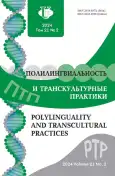On the Anthroponyms of the North, Siberia and the Far East Peoples: Nenets, Evens, Chukchi
- Authors: Petrov A.A.1
-
Affiliations:
- Russian State Pedagogical University named after A.I. Herzen
- Issue: Vol 21, No 2 (2024)
- Pages: 195-212
- Section: Language in System
- URL: https://journal-vniispk.ru/2618-897X/article/view/326929
- DOI: https://doi.org/10.22363/2618-897X-2024-21-2-195-212
- EDN: https://elibrary.ru/KMELHG
- ID: 326929
Cite item
Full Text
Abstract
The purpose of this article is to study the anthroponyms of the indigenous peoples of the North, Siberia and the Far East in a comparative manner. The author studies the problem of the existence of personal names, surnames, nicknames, ethnonyms in the languages of various types of northern peoples: Ural (Nenets), Altai (Evens) and Paleo-Asian (Chukchi) in inextricable connection with their ethnic culture. In comparative terms, anthroponyms of other northern ethnic groups are used: Evenks, Nanais, Udeges. The object of the study is anthroponyms, as well as linguistic connections between the indigenous peoples of the North and Russians in synchronic and diachronic aspects from the standpoint of modern linguistic contactology. The subject of the research is personal names, surnames, nicknames, ethnonyms of indigenous small peoples of the North, Siberia and the Far East: Nenets, Evens, Chukchi. Research methods: descriptive, comparative, phonetic, lexical-semantic and morphological analyses. The theoretical and practical significance of the study is associated with the low degree of its study, the lack of special scientific works devoted to the problem of anthroponyms in the comparative aspect. Attention is also paid to contacting languages and cultures in the regions of the North, Siberia and the Far East of the Russian Federation. The results of the work revealed facts that stated that the personal names, surnames, nicknames and ethnonyms of the peoples of the North are distinguished by great diversity, and their origin and existence are associated with the characteristics of the material and spiritual culture of ethnic groups; Among the extralinguistic factors that influenced the linguistic material, one of the main ones was the close communication of the indigenous inhabitants with the Russian population of the region. The author comes to the conclusion that the material under study - anthroponyms - has gone through a difficult path of contact, mutual enrichment and development; In borrowed words, primarily phonetic and lexical differences are revealed. In the field of grammar, the main ways of forming anthroponyms have been identified: morphological (suffixal), basic composition, conversion; the most common derivational and inflectional suffixes are given, including those that form male and female names and nicknames.
About the authors
Alexander A. Petrov
Russian State Pedagogical University named after A.I. Herzen
Author for correspondence.
Email: petrovalexspb@mail.ru
ORCID iD: 0000-0003-0075-3742
Doctor of Philological Sciences, Professor, Professor of the Department of Altai Languages, Folklore and Literature, Institute of the Peoples of the North
48 emb. R. Moiki, St. Petersburg, 191186, Russian FederationReferences
- Nenyang, L.P. 1996. Our names. On the issue of naming and the existence of proper names among the Nenets of Taimyr. Anthroponymic essay. St. Petersburg: Department of the publishing house “Enlightenment.” Print. (In Russ.)
- Barmich, M.Ya. 1980. “Semantics of personal names of the Nenets.” In Lexico-grammatical studies of the languages of the peoples of the North of the USSR. Leningrad, pp. 83–102. Print. (In Russ.)
- Vanuito, G.I. 2002. Dictionary of Nenets personal names. Tomsk: Tomsk University Publishing house. Print. (In Russ.)
- Khomich, L.V. 1973. “Some questions of Nenets anthroponymy.” In Origin of the aborigines of Siberia and their languages. Materials of the All-Union Conference, June 14–16, 1973. Tomsk: Tomsk University Publishing House, pp. 153–155. Print. (In Russ.)
- Sharina, S.I., and I.I. Sadovnikova. 2015. Even name. Yakutsk: IGIiPMNS SB RAS publ. Print. (In Russ.)
- Fairy tales of the peoples of the North. 1959. Composed, edited by M.G. Voskoboinikov and G.A. Menovshchikov. Moscow-Leningrad: Publishing house of fiction. Print. (In Russ.)
- Lebedev, V.D. 1978. Language of the Evens of Yakutia. Leningrad: Science publ. Print. (In Russ.)
- Robbek, V.A. 1989. Language of the Evens of Berezovka. Leningrad: Science publ. Print. (In Russ.)
- Petrov, A.A. 2013. “M.M. Robek and his “Brief Dictionary of Twelve Adverbs..” In Scientific foundations of sustainable development of indigenous peoples of the North: materials of the republican scientific and practical conference dedicated to the 75th anniversary of the birth of V.A. Robbek, Yakutsk, February 17, 2012. Novosibirsk, pp. 19–22. Print. (In Russ.)
- Dutkin, H.I. 1980. “On the personal names of the Evens of the Allaikhovsky region of the YASSR”. In Questions of language and folklore of the peoples of the North. Yakutsk: YaF SB AN USSR publ., pp. 75–76. Print. (In Russ.)
- Vinokurova, A.A. 2017. Workshop on the Even language course (Phonetics. Vocabulary). Yakutsk: Publishing House LLC New Vision. Print. (In Russ.)
- Rytkheu, Yu.S. 2010. Road vocabulary. St. Petersburg: Zvezda Journal. Print. (In Russ.)
- Kiele, N.B. 1973. “Anthroponymy among the Nanai.” In Origin of the aborigines of Siberia and their languages: Materials of the All-Union Conference. Tomsk: Tomsk University Publishing House, pp. 150–153. Print. (In Russ.)
- Podmaskin, V.V. 1977. “Udege personal names.” In Philology of the peoples of the Far East (Onomastics). Vladivostok, pp. 102–106. Print. (In Russ.)
- Kureyskaya, E.A. 2000. What’s your name, bae? Dictionary of Evenki names. Tura: Department of Culture of the Evenki Autonomous Okrug. Community Center for Ethnic Culture. Print. (In Russ.)
- Demidova, G.I. 2009. On the study of the names of students of the Institute of Northern Peoples In University districts of Russia: global and regional aspects of the development of Russian education: materials of the Third All-Russian scientific-practical conference, Kazan, May 15–16, 2009. St. Petersburg; Kazan, pp. 71–78.
Supplementary files









